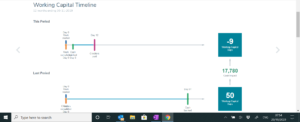Owners I meet regularly need focusing on the blind spot “how quickly is the money hitting the bank?”. Or put bluntly “how good am I as a business owner?”. Since the owner’s primary responsibility is ensuring cash flows into the business. Even if finance is delegated you are accountable!
What’s the issue?
When business dips occur most focus on what’s happening to revenue and cost on the Profit & Loss Statement. And why not? That’s important, it shows if you are profitable, right? “Our revenue is down; we are over budget…” good job noticing.
It’s the uncertainty of whether everything (or everyone) can be paid that month that comes up most when asked about stress. Along with concern over staffing consistently great service and finding great new clients, which require profit and cash.
Your P&L only tells you historically which invoices moved through your business. It’s not a forecast of how much cash will be in the bank for the next three months. That’s a cash flow forecast, sadly far rarer in business.
Using your P&L to make business decisions, without a cash flow forecast, is the equivalent of driving your car by looking in the rear-view mirror. Without a fuel gauge!
How often does your accountant talk you through your balance sheet? I find this is rare and owners minds are often blown. They will typically (hopefully!) mention your Working Capital.
So, the solution.
Let’s translate that into business manager language.
You need to focus on three things to run your business each week increasingly better (improving the balance sheet). They do not appear on your P&L but are as, if not more, important:
- Your accounts receivable. How often do you receive, review and act on a report detailing outstanding invoices (tip: weekly at a minimum)? Or, to put it another way, how much of your money is currently in other people’s bank accounts?
- Your work in progress (if a service business) or inventory. Do you monitor and improve the rate at which you convert your work done (for services) or inventory into an invoice? Tip: systemise to be paid, at least in part, up front.
- Your accounts payable. How do you monitor and determine when to pay suppliers, balancing deserving great ones with your own need for good cash management?
The evidence
The timeline in the image is from an anonymous client. It’s a relatively small business to show anyone can and should focus on this. By improving in these three areas they effectively ‘flowed’ an additional £18,000 cash into their bank.

More importantly, they systemised to consistently ensure they were a great cash flow business – always.
This kept them going and investing in growth (marketing) when things got tight during lock down. While competitors had to cut investments in acquiring or servicing clients to focus on chasing their own cash. At a time when others were holding on to it for dear life.
Any actions?
Which of these three do you need to sharpen up on? Not “a bit more effort in collecting cash this month please”, then back to normal. I mean systemising and using proven strategies to consistently improve all three critical measures, as part of the quarterly management of your business.
Whatever time and money you invest in developing at this has a clear return on investment, you stay in business and gain competitive advantage. As you have cash to invest in growth while many are poor at it.
You can take dividends out of your business when the P&L says you are profitable! Versus it failing to convert into money in the bank, or a fear of taking it out because you don’t know what you’ll need.
A final thought
This article is written in the hope that it will jolt you into action where needed, peak a blind spot, something you were not focused on. I hope it has achieved this.
Many of those I speak with are working long hours, not seeing a return, or achieving their goals. Even eventually burning out. It impacts many others and is a terrible waste after all your effort.
All businesses need to succeed to ensure a better economy for everyone. As business owners we are ‘essential workers’, let’s all step up and act like it.
With that in mind, if you need some help please connect and we can set up a call.







Thanks for sharing. I read many of your blog posts, cool, your blog is very good.
Your article helped me a lot, is there any more related content? Thanks!